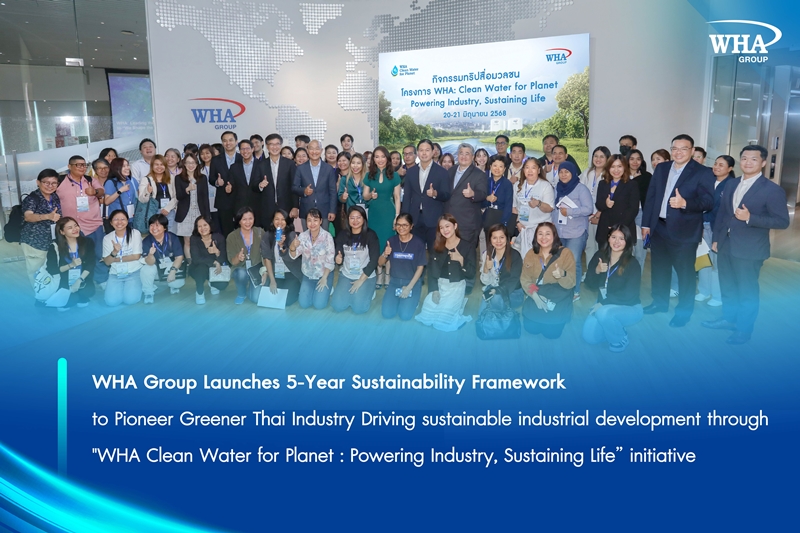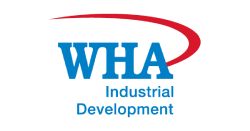Company News
WHA Group Launches 5-Year Sustainability Framework to Pioneer Greener Thai Industry Driving sustainable industrial development through "WHA Clean Water for Planet: Powering Industry, Sustaining Life” initiative
24/06/2025
WHA Corporation Public Company Limited (WHA Group), a leader in logistics, industrial development, utilities & power, digital solutions, and WHA mobility, reaffirms its vision as a Tech & Sustainable Company. This commitment is powered by robust ESG (Environmental, Social, and Governance) initiatives, strategically designed to accelerate Thailand's transition towards a low-carbon economy.
Jareeporn Jarukornsakul, Chairman of the Executive Committee and Group Chief Executive Officer of WHA Corporation Public Company Limited, said, "WHA Group is actively shaping a better future and unlocking new business opportunities. We don't just react to change; we proactively prepare for evolving global trends, mitigating risks and seizing new opportunities. By seamlessly integrating innovation, technology, and core business principles across all ESG dimensions, we are pioneering an advanced, environmentally friendly industrial ecosystem. This delivers lasting value to society and all our stakeholders."
Demonstrating its unwavering dedication to sustainable development, WHA Group has set an ambitious Net Zero target by 2050. This comprehensive goal includes reducing direct and indirect greenhouse gas emissions (Scope 1, 2, and 3). Furthermore, the Group is committed to achieving 100% circularity, notably through 100% wastewater reuse. Beyond carbon, WHA Group also aims to create a Biodiversity Net Positive Impact, actively working to restore ecological balance for a truly sustainable future.
In 2025, WHA Group significantly reinforced its flagship project, "WHA Clean Water for Planet: Powering Industry, Sustaining Life." This initiative stands as a pioneering model for sustainable water management, intricately linking industry, communities, and society. Far beyond mere water supply and treatment, the project establishes a holistic "sustainable water ecosystem" that extends from industrial operations to local communities. With plans for broader expansion, it aims to bolster water resource security and foster balanced economic growth. This is particularly crucial given the global industrial challenges of climate change, water scarcity, stricter regulations, and inefficient water usage. The project's core focus is maximizing water resource value and efficiency, positioning sustainable water management as a cornerstone of modern economic and social development.
Additionally, WHA Group has laid a strong foundation through its 5-year sustainability framework, defining key missions across 5 main areas:
- Green Mobility Ecosystem: This mission supports environmentally friendly transportation through Built-to-Suit solutions, custom-designed to meet customer needs and foster sustainability in Thailand's logistics sector under the Mobilix brand. Offerings include EV Rental Service - a comprehensive electric vehicle rental service; On-Premise & Public EV Charging Solution - charging stations and related equipment for personal and commercial electric vehicles; and Mobilix Software Solution - a modern, intelligent digital platform for managing electric vehicles and batteries. As of Q1 2025, Mobilix has rented out over 330 electric vehicles, enabling logistics operators to access EV usage and saving transportation operators over 600 million Baht. The target is to provide 20,000 electric vehicles by 2029, which will reduce greenhouse gas emissions by 280,000 tons of CO₂e per year.
- Integrated Water Management (Water Conservation Program): This program creates a sustainable water ecosystem covering both industry and communities through the WHA: Clean Water for Planet project. It involves highly efficient water management, from sourcing and developing raw water sources to mitigate scarcity risks, to producing and distributing various types of industrial water such as Clarified Water, Demineralized Water, and Water Reclamation. The program also includes wastewater treatment and reuse systems to produce high-quality water for industrial use, thereby reducing water consumption from natural sources and minimizing wastewater discharge into the environment. Environmentally friendly artificial wetland wastewater treatment systems are utilized, alongside smart water management incorporating AI, IoT, SCADA, and Smart Meters (OCR) to efficiently control water management, reduce water loss in the system, and decrease energy consumption. The target is to manage a total of 173 million cubic meters of water in 2025 and reduce natural water source consumption by 25 million cubic meters per year by 2029, equivalent to the water usage of over 685,000 people. Furthermore, industrial water management will be extended to communities, society, and the environment. Concrete examples include the Wang Tanod Artificial Wetland Project in Nong Khla Subdistrict Municipality, Chanthaburi Province, covering 15 rai, capable of treating 400 cubic meters of wastewater per day and expandable to 800 cubic meters per day to accommodate future increases, treating wastewater from the Nong Khla community using natural processes. The "Environmental Detectives" project continuously educates students about the importance of water and water resource conservation; in 2024, 892 students from 8 schools around the industrial estate were trained.
- Decarbonization Solutions: This mission aims to reduce greenhouse gas emissions from WHA Group's direct and indirect operations. Initiatives include accelerating the installation of solar panels on rooftops, floating solar, and ground-mounted solar farms in water treatment plants, wastewater treatment plants, reservoirs, office buildings, and parking lots. Solar LEDs are also installed for street lighting within the industrial estates to increase the proportion of renewable energy use and reduce reliance on fossil fuels. In 2025, an additional 1.6 MW of solar installed capacity will be added, saving 6.2 million Baht per year in electricity costs. The expansion of renewable energy business targets accumulated Private PPA contracts of 657 MW in 2025 and 1,200 MW in 2029, which will reduce greenhouse gas emissions by 683,000 tons of CO₂e, generate over 5,600 million Baht in revenue per year, and save customers 1,860 million Baht per year in electricity costs. Additionally, various energy-saving innovations are being implemented in warehouse buildings, the head office building, and industrial estate utilities to enhance energy efficiency and extend into a business by offering energy-saving solutions to customers. The goal is also to convert over 33% of the group's operational vehicles from internal combustion engines (ICE) to electric vehicles (EVs) by 2025 and continuously conduct tree-planting activities in the green areas of industrial estates with various partners.
- Green Construction: The group prioritizes developing buildings that minimize environmental impact and consider stakeholders throughout the entire process, from design and material selection to construction and operation. This integrates comprehensive sustainability approaches under three key principles: selecting low-carbon and recycled materials, emphasizing waste management, and designing for resilience, durability, and efficiency. A successful example is the WHA Mega Logistics Center Theparak Km. 21 (Building B), with an area of 27,212 sq.m., which has received LEED Gold v4.1 BD+C certification. Its design and development techniques, based on passive design principles, help reduce energy consumption, while solar panel installation reduces greenhouse gas emissions by 140,000 kg of carbon per year. The use of water-saving equipment is expected to reduce tap water consumption by over 50%, or approximately 358,000 liters per year. Furthermore, interior decorative materials are low-carbon or recycled products to promote the circular economy concept. WHA Tower is designed to be environmentally friendly, with spacious office areas (2.9 meters high) and triple-glazed windows that block 70% of heat, saving energy from air conditioning and allowing natural light into the building. All lighting in the building uses energy-saving LED bulbs, saving up to 50% energy. In new industrial estate development projects, low-carbon construction materials are used, such as hydraulic cement, which reduces carbon emissions by up to 30%, and glass fiber reinforced polymer (GFRP) instead of steel rebar, which reduces carbon emissions by up to 90%.
- Waste Reduction by 3Rs: WHA implements the 3Rs policy (Reduce, Reuse, Recycle), a sustainable approach to waste and resource management, emphasizing efficient resource utilization to achieve the goal of zero waste to landfill. This is achieved through various successful projects, such as the project to use leftover concrete to cast paving blocks, which reduced 191 tons of leftover concrete and produced 5,500 recycled paving blocks. Other initiatives include converting sludge into soil fertilizer and recycling water filter cartridges into wheel stops and concrete curbs. The Chonburi Clean Energy (CCE) project, an industrial waste-to-energy power plant, disposed of 120,913 tons of waste in 2024 and converted it into 54,823 MWh of electricity. The WeCYCLE project, based on the circular economy concept, focuses on waste segregation within the group's operational areas for recycling and upcycling processes, launched in 2022. Examples include converting PET bottles into school bags (reducing 68 tons of plastic bottles); processing used paper into educational materials (reducing 176 tons of paper waste); and converting used cooking oil into Sustainable Aviation Fuel (SAF) (reducing 2 tons of used oil waste). All these projects combined have helped reduce atmospheric carbon by a total of 378 tons of CO₂e, with the participation of over 126 companies.
WHA Group is equally dedicated to improving quality of life and fostering strong stakeholder relationships through four core social and community initiatives, including supporting education with scholarships and equipment to develop youth potential; enhancing health and quality of life by improving community well-being, providing vaccines, and developing Smart Traffic systems to reduce accidents in industrial estates; contributing to environmental efforts through the "Shine Brighter with WHA" project (installing Solar Rooftops in schools), the WeCYCLE project, tree-planting initiatives, and the WHA Clean Water for Planet project; and fostering career and community economic opportunities via the WHA E-Job Pool project to increase employment and develop labor potential to support industrial expansion as well as promote local products through the WHA Pan Gun project, among others.
"WHA Group's very essence is about creation – specifically, creating prosperity hand-in-hand with sustainability. This has been ingrained in our DNA from day one," Jareeporn concluded. "We view these efforts not as costs, but as vital investments in our future. This commitment is the embodiment of our guiding principle: 'WHA: We Shape The Future.'"

